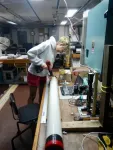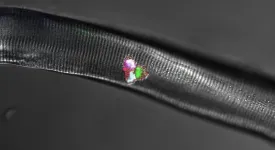(Press-News.org) Our use of social media, specifically our efforts to maximize "likes," follows a pattern of "reward learning," concludes a new study by an international team of scientists. Its findings, which appear in the journal Nature Communications, reveal parallels with the behavior of animals, such as rats, in seeking food rewards.
"These results establish that social media engagement follows basic, cross-species principles of reward learning," explains David Amodio, a professor at New York University and the University of Amsterdam and one of the paper's authors. "These findings may help us understand why social media comes to dominate daily life for many people and provide clues, borrowed from research on reward learning and addiction, to how troubling online engagement may be addressed."
In 2020, more than four billion people spent several hours per day, on average, on platforms such as Instagram, Facebook, Twitter, and other more specialized forums. This widespread social media engagement has been likened by many to an addiction, in which people are driven to pursue positive online social feedback, such as "likes," over direct social interaction and even basic needs like eating and drinking.
While social media usage has been studied extensively, what actually drives people to engage, sometimes obsessively, with others on social media is less clear.
To examine these motivations, the Nature Communications study, which also included scientists from Boston University, the University of Zurich, and Sweden's Karolinska Institute, directly tested, for the first time, whether social media use can be explained by the way our minds process and learn from rewards.
To do so, the authors analyzed more than one million social media posts from over 4,000 users on Instagram and other sites. They found that people space their posts in a way that maximizes how many "likes" they receive on average: they post more frequently in response to a high rate of likes and less frequently when they receive fewer likes.
The researchers then used computational models to reveal that this pattern conforms closely to known mechanisms of reward learning, a long-established psychological concept that posits behavior may be driven and reinforced by rewards.
More specifically, their analysis suggested that social media engagement is driven by similar principles that lead non-human animals, such as rats, to maximize their food rewards in a Skinner Box--a commonly used experimental tool in which animal subjects, placed in a compartment, access food by taking certain actions (e.g., pressing a particular lever).
The researchers then corroborated these results with an online experiment, in which human participants could post funny images with phrases, or "memes," and receive likes as feedback on an Instagram-like platform. Consistent with the study's quantitative analysis, the results showed that people posted more often when they received more likes--on average.
"Our findings can help lead to a better understanding of why social media dominates so many people's daily lives and can also provide leads for ways of tackling excessive online behavior," says the University of Amsterdam's Bjo?rn Lindstro?m, the paper's lead author.
INFORMATION:
The study's other authors are the University of Amsterdam's David Schultner, Martin Bellander of Sweden's Karolinska Institute, Boston University's Allen Chang, and the University of Zurich's Philippe Tobler.
The research was supported, in part, by a grant from the Netherlands Organization for Scientific Research (VICI 016.185.058).
DOI: 10.1038/s41467-020-19607-x
Chemical engineering researchers have developed a new catalyst that significantly increases yield in styrene manufacturing, while simultaneously reducing energy use and greenhouse gas emissions.
"Styrene is a synthetic chemical that is used to make a variety of plastics, resins and other materials," says Fanxing Li, corresponding author of the work and Alcoa Professor of Chemical Engineering at North Carolina State University. "Because it is in such widespread use, we are pleased that we could develop a technology that is cost effective and will reduce the environmental impact of styrene manufacturing." Industry estimates ...
The koala retrovirus (KoRV) is a virus which, like other retroviruses such as HIV, inserts itself into the DNA of an infected cell. At some point in the past 50,000 years, KoRV has infected the egg or sperm cells of koalas, leading to offspring that carry the retrovirus in every cell in their body. The entire koala population of Queensland and New South Wales in Australia now carry copies of KoRV in their genome. All animals, including humans, have gone through similar "germ line" infections by retroviruses at some point in their evolutionary history and contain many ancient retroviruses in their genomes. These retroviruses have, over millions of years, mutated into degraded, inactive forms that are no longer harmful to the host. Since in most animal ...
NARRAGANSETT, R.I. - February 26, 2021 - A team of researchers from the University of Rhode Island's END ...
When a muscle grows, because its owner is still growing too or has started exercising regularly, some of the stem cells in this muscle develop into new muscle cells. The same thing happens when an injured muscle starts to heal. At the same time, however, the muscle stem cells must produce further stem cells - i.e., renew themselves - as their supply would otherwise be depleted very quickly. This requires that the cells involved in muscle growth communicate with each other.
Muscle growth is regulated by the Notch signaling pathway
Two years ago, a team of researchers led by Professor Carmen Birchmeier, head of the Developmental Biology/Signal Transduction ...
A new study shows that a widespread decline in abundance of emergent insects - whose immature stages develop in lakes and streams while the adults live on land - can help to explain the alarming decline in abundance and diversity of aerial insectivorous birds (i.e. preying on flying insects) across the USA. In turn, the decline in emergent insects appears to be driven by human disturbance and pollution of water bodies, especially in streams. This study, published in END ...
Who would have thought that a small basic compound like vitamin B6 in the banana or fish you had this morning may be key to your body's robust response against COVID-19?
Studies have so far explored the benefits of vitamins D and C and minerals like zinc and magnesium in fortifying immune response against COVID-19. But research on vitamin B6 has been mostly missing. Food scientist END ...
HDL cholesterol (high-density lipoprotein cholesterol) or good cholesterol is associated with a decreased risk of cardiovascular disease as it transports cholesterol deposited in the arteries to the liver to be eliminated. This contrasts with the so-called bad cholesterol, LDL (low-density lipoprotein cholesterol), which causes cholesterol to accumulate in the arteries and increases cardiovascular risk. Although drugs that lower bad cholesterol reduce cardiovascular risk, those that raise good cholesterol have not proven effective in reducing the risk of heart disease. This paradox has called into question the ...
Whilst the nation has taken to washing its hands regularly since the start of the pandemic, other individual behaviours, such as cleaning and disinfecting surfaces or social distancing within the home, have proved harder to stick, say the researchers behind the behaviour change website 'Germ Defence'.
In their new study, published today (Friday 26 February 2021) in the Journal of Medical Internet Research, psychologists from the universities of Bath, Bristol and Southampton, warn of the continuing risks of household transmission of COVID-19 and the ongoing importance of breaking chains of transmission now and in the future.
Their research analysed user data of the ...
Treating critically ill COVID-19 patients with drugs typically used for rheumatoid arthritis may significantly improve survival, a landmark study has found.
The findings, which were announced in January and have now been peer-reviewed and published in the New England Journal of Medicine, come from the REMAP-CAP trial, which evaluates the effect of treatments on a combination of survival and length of time patients need support in an intensive care unit (ICU).
Initial findings reported in November showed that tocilizumab, a drug used to treat arthritis, was likely to improve outcomes among critically ill COVID-19 ...
Clinical research requires that data be mined for insights. Machine learning, which develops algorithms to find patterns, has difficulty doing this with data related to health records because this type of information is neither static nor regularly collected. A new study developed a transparent and reproducible machine learning tool to facilitate analysis of health information. The tool can be used in clinical forecasting, which can predict trends as well as outcomes in individual patients.
The study, by a researcher at Carnegie Mellon University (CMU), appears in Proceedings of Machine Learning Research.
"Temporal Learning Lite, or TL-Lite, is a visualization and forecasting tool to ...


